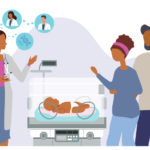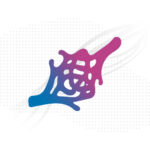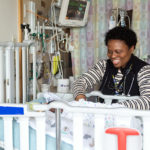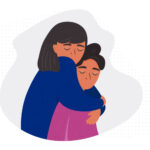I’ve been there, too: What my baby’s tumor taught me as a NICU nurse
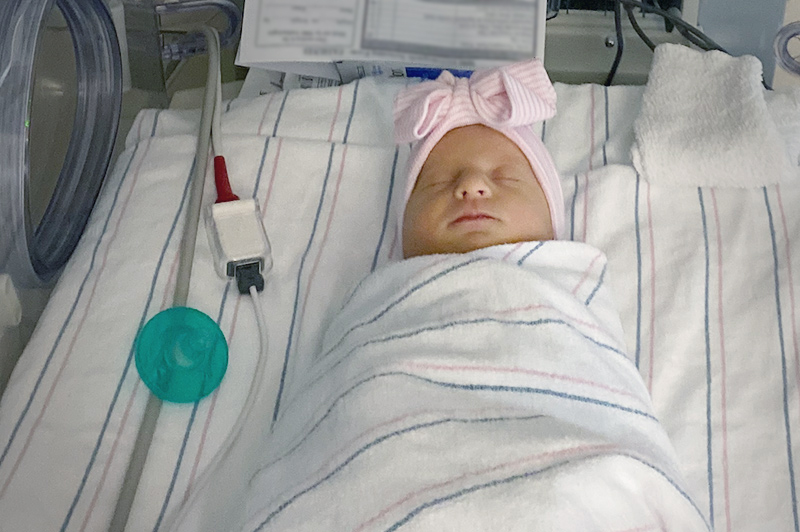
I had a toddler at home when I found out I was pregnant with my twins, Hannah and Sophie. Since I had already had a baby, I thought I knew what to expect during my pregnancy. I also work in the neonatal intensive care unit (NICU) at Boston Children’s Hospital, so I thought I was prepared for anything that may happen after the girls arrived. But when Hannah was born with an infantile myofibroma (IM), I watched all my “expertise” disappear. IMs are extremely rare, non-cancerous tumors that most often grow on the skin, muscles, or bone.
A surprise at delivery
Despite a healthy pregnancy without any prenatal diagnoses and an uncomplicated delivery, my OB team noticed a mass on Hannah’s leg as soon as she was born. My first words after they told me were, “when is Boston Children’s getting here?” The next day, a Boston Children’s surgical team member came to my room to meet Hannah. Her words — “I think this is a tumor” — have stayed with me a whole year later. Hearing those words was the moment I became one of the parents I’ve spent my entire career comforting.
The best caregivers in the world
Hannah was immediately transferred to Boston Children’s NICU while Sophie and I stayed behind in our delivery hospital. The day Sophie and I were discharged home, Hannah underwent surgery to remove her tumor. I had the utmost confidence in Dr. Steven Fishman and the Vascular Anomalies team who performed Hannah’s surgery, but it was still an odd mix of emotions — returning home with one baby while sending the other to go under anesthesia and have an operation without me by her side. I felt divided between who needed me most: my girls at home or my girl in the hospital. I relied so much on my colleagues to care and advocate for Hannah when I couldn’t do it myself.
It was humbling to be on the other side of the hospital bed and to receive the same care and compassion from my colleagues that they show each and every baby and family who arrives in the NICU. They really are the best caregivers in the world.
A new perspective
I’m so grateful for the love and attention Hannah received during her week at Boston Children’s and the amazing care she now gets from Dr. Junne Kamihara and the team at the Pediatric Cancer Genetic Risk Program at the Dana-Farber/Boston Children’s Cancer and Blood Disorders Center where she is monitored for any new tumor growth. But I’m also grateful for what this experience has taught me as a nurse.
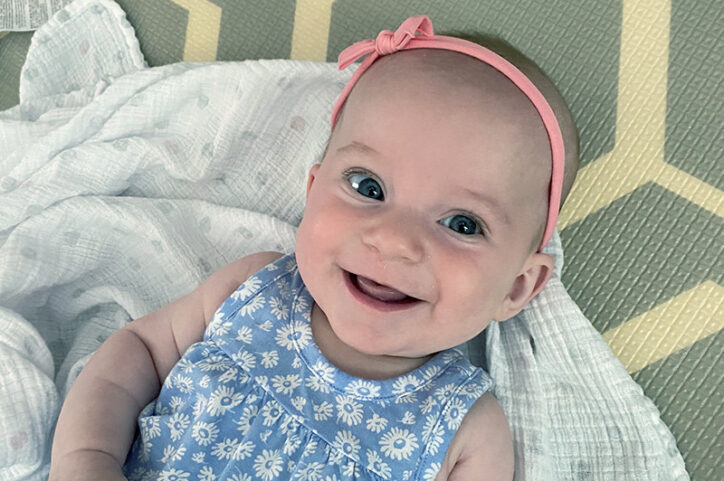
I’m trained to take care of babies. Still, when Hannah was born, I didn’t feel like I could do that fully given my own recovery and the needs of my other children. My NICU colleagues were my eyes, ears, and brain for a little while, which I’ll be forever grateful for. The experience has also helped me appreciate nurses and health care providers from a whole new perspective. As a NICU nurse, my focus has always been on advocating for babies who can’t advocate for themselves, but it’s also important to recognize that new parents also need support. My patients’ moms haven’t just delivered a baby, they’re healing from a huge event that’s exhausting and scary and often brand new — all while navigating health care decisions, feedings, family at home, and the myriad other things that come with having a baby. At the end of the day, it’s hard for them to focus on their own needs because they’re so busy focusing on the needs of others. That’s why it’s up to me to be their eyes, ears, and brain sometimes, too.
Learn more about the Pediatric Cancer Genetic Risk Program at the Dana-Farber/Boston Children’s Cancer and Blood Disorders Center and about services for parents available through The Hale Family Center for Families.
Related Posts :
-

Bringing genomics to community NICUs
About a year and a half ago, Robert Rothstein, MD, FAAP encountered a baby with a pattern of facial features ...
-

Targeting treatments for vascular anomalies, courtesy of cancer genetics
Vascular anomalies — overgrowths or malformations of the capillaries, veins, arteries, and/or lymphatic vessels — often confound physicians, especially in acute ...
-

Boston Children's nurses: Setting the standard for innovation
As clinicians at Boston Children’s Hospital continue to pioneer new therapies for both kids and adults, nurses play a ...
-

The art of showing up: Six ways to support a friend who has a child in the hospital
“Let me know if there’s anything I can do.” Nine little words spoken with the best of intentions but ...


